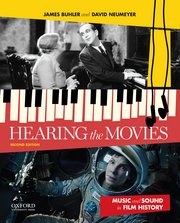| COURSE INFORMATION |
|---|
| Description: |
An introduction to the role of music in the sound track of films.
Although the emphasis is on Hollywood films of the sound era, some discussion of foreign films and silent films is also included.
A background in music appreciation is not needed.
The ability to read music is not needed.
|
| Meeting Days, Times, and Location |
MTWRF 0920AM-1130AM Mountain Time, FOX M402
|
| Prerequisite: | Junior standing |
| INSTRUCTOR INFORMATION |
|---|
| Name: | Charles Francis Leinberger |
| E-mail: | CHARLESL@UTEP.EDU |
| Office: | Fox Fine Arts Center, Room M401B |
| Office Phone: | (915) 747-7800 |
| Office Hours: | Charles Francis Leinberger's Office Hours |
| Biography: | Charles Francis Leinberger's Biography |
| TEXTBOOK |
|---|
| Textbook: | James Buhler and David Neumeyer:
Hearing the Movies, 2nd Edition (Required) |

|
| Facebook: | www.facebook.com/utepmusicandfilm |
| Also See: | The Internet Movie Database
Plaza Classic Film Festival
|
| Supplemental Reading: |
Jon Burlingame: The Music of James Bond
Robert C. Cumbow: The Films of Sergio Leone
Kate Daubney: Max Steiner's Now, Voyager: A Film Score Guide
Cynthia Farah Haines: Showtime! From Opera Houses to Picture Palaces in El Paso
Roger Hickman: Reel Music: Exploring 100 years of Film Music
Kathryn Kalinak, editor: Music in the Western: Notes from the Frontier
Charles Leinberger: Ennio Morricone's The Good, the Bad and the Ugly: A Film Score Guide
James Wierzbicki: Film Music: A History
|
| Required Equipment: |
Headphones: Earbuds are definitely not recommended.
Students should invest in high-quality headphones.
Noise-cancelling headphones, such as Bose, Sony, and Beats, are very strongly recommended.
Bluetooth-enabled headphones are acceptable but not necessary and may cause a very slight delay between video and audio.
Students will need reliable internet access and a very quiet place to study.
|
| COURSE GOALS, OBJECTIVES, AND TEACHING PHILOSOPHY. |
|---|
| Course Goal: |
- To develop leadership skills and a hightened awareness of the impact of music, film, and all of the arts on our community, locally, nationally, and globally.
- To provide the student with an awareness of the elements of the music that affects our lives every day;
- To provide the student with an understanding of music's history and how music affects, and is affected by, culture and events worldwide;
- To enable the student to discuss how and why music contributes to a better quality of life;
- To foster a life-long love of music and a desire to support music and all of the arts.
|
| Course Objective: |
Upon successful completion of the course, the student will be able to:
- Understand and appreciate the complexities with which sound is used in film and the role of music as one element of a film's soundtrack;
- Understand and appreciate the creation and use of music in cinema as both craft and art;
- Understand the unique challenges that composing for film presents;
- View a film with a critical ear for the film score and not as a passive viewer;
- Appreciate the contributions to the art by those who compose for both Hollywood films and foreign films.
|
| Teaching Philosophy: |
Charles Francis Leinberger's Teaching Philosophy
|
| GRADING |
|---|
| The final grade will be calculated according to the following point values: |
| 12 Quizzes |
25 points each |
300 points |
30% of final grade |
| Exam 1 |
100 points |
10% of final grade |
| Exam 2 |
100 points |
10% of final grade |
| Final Exam |
300 points |
30% of final grade |
| Community Engagement & Leadership |
200 points |
20% of final grade |
| Total Points Possible |
1000 points |
100% of final grade |
| Letter grades will be assigned based on the total number of points earned.
|
| A |
900-1000 points |
90.0-100.0% |
| B |
800-899 points |
80.0-89.9% |
| C |
700-799 points |
70.0-79.9% |
| D |
600-699 points |
60.0-69.9% |
| F |
0-599 points |
0.0-59.9% |
| W | A grade of "W" (Withdrawal) will be assigned only if a student drops the course before the Course Drop Deadline, which is the Friday of Week 3.
|
| I | A grade of "I" (Incomplete) will be assigned only if the student provides documentation for a situation that prevents him or her from completing the requirements for a passing grade.
These situation include, but are not limited to, hospitalization, incarceration, and military deployment. |
| COURSE POLICIES |
|---|
The following policies apply to all of Dr. Leinberger's classes:
- Attendance Policy
- Assignment Policy
- Classroom Policy
- Final Exam Policy and Schedules
- Each student should check his or her UTEP email account each day of the semester when registered for this class.
The following policies apply to this class:
- Come to class on time and prepared.
- Quizzes and exams will be availabnle in Blackboard.
Students enrolled should log into MY.UTEP.EDU and click on "Blackboard."
Once in Blackboard, depending on your browser, look for the menu on the left. Find "MUSL 3332" under "Courses."
- There will be a quiz or exam almost every day.
If a student misses a quiz or exam due to an excused absence (university function, medical emergency, car trouble, etc.), the student may take the quiz, but must do so before the next class meeting.
- The Exams will be Monday of Week 2 and Thursday of Week 3.
Students will have two hours and ten minutes to complete each exam.
- Spoiler Alert:
During the screening of some films, or parts of films, in class, students may learn the surprise endings of films that they have not yet seen in their entirety.
- Some films, or parts of films, that are screened in class may contain profanity, violence, adult subject matter, sexuality, nudity, and depictions of acts of racism and sexism.
Students who are easily offended by such content should consider enrolling in a music literature course other than MUSL 3332, Music and Film.
|
| SUMMER |
SCHEDULE |
| Day |
Week |
Weekday |
Topic |
Test |
| 1 |
1 |
W |
Part I |
Buhler and Neumeyer: Introduction, Chapter 1: The Soundtrack and Narrative |
Quiz 1 |
| 2 |
R |
Buhler and Neumeyer: Chapter 2: The Musicality of the Soundtrack |
Quiz 2 |
| 3 |
F |
Buhler and Neumeyer: Chapter 3: Music, Sound, Space, and Time |
Quiz 3 |
| 4 |
2 |
M |
Review for Exam 1 |
None |
| 5 |
T |
Exam 1 |
Exam 1 |
| 6 |
W |
Part II |
Buhler and Neumeyer: Chapter 4: From 1895 to 1929 |
Quiz 4 |
| 7 |
R |
Buhler and Neumeyer: Chapter 5: From 1926 to 1932 |
Quiz 5 |
| 8 |
F |
Buhler and Neumeyer: Chapter 6: The Broadway Melody, Gold Diggers of 1933, and Le Million
The Dawn of Sound: How Movies Learned to Talk and Okay for Sound
|
Quiz 6 |
| 9 |
3 |
M |
Buhler and Neumeyer: Chapters 7 and 8: From 1932 to 1950 and Mildred Pierce
|
Quiz 7 |
| 10 |
T |
Buhler and Neumeyer: Chapter 9: From 1950 to 1975 |
Quiz 8 |
| 11 |
W |
No class |
None |
| 12 |
R |
Buhler and Neumeyer: Chapter 10: Music and Film Form in the Post-Classical Era |
Quiz 9 |
| 13 |
F |
Review for Exam 2 |
None |
| 14 |
4 |
M |
Exam 2 |
Exam 2 |
| 15 |
T |
Part III |
Buhler and Neumeyer: Chapter 11: From 1975 to 2000, Course Drop Deadline |
None |
| 16 |
W |
Buhler and Neumeyer: Chapter 12: Music and Film Form in the New Hollywood |
Quiz 10 |
| 17 |
R |
Buhler and Neumeyer: Chapter 13: Music and Film Sound Since 2000
Buhler and Neumeyer: Chapter 14: Music and Film Form Since 2000 |
Quiz 11 |
| 18 |
F |
Buhler and Neumeyer: Chapter 15: Writing about Film Music |
Quiz 12 |
| 19 |
5 |
M |
Review for Final Exam |
None |
| 20 |
T |
Final Exam |
Parts I, II, III |
Final Exam |


